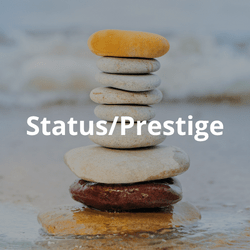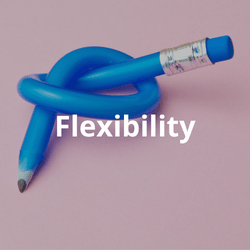
Overcome Fear and Change Your Career
People change careers for many reasons and while moving into an entirely different field may seem like a daunting task, it happens more often than you might think. But where do you start when it comes to changing careers?
First things first, you are going to need to have some very honest conversations with yourself. A career is best built on a solid foundation of knowing what is important to you personally.
Think about how important the following elements are to you.
Try ranking them and considering what you would be willing to compromise on:









Take into consideration your personal circumstances and commitments. Something that might be useful to you is to consider applying Maslow’s needs pyramid to your career choice.
We’ve all had the classic interview question “what are your strengths and weaknesses?” Well, now is the time to do a real deep dive into these areas! Finding a career that will complement your strengths and weaknesses will ultimately help you flourish. There are personality tests that can help you begin this conversation with yourself, such as the OCEAN test or MyersBriggs Type Indicator test.
Don’t forget to consider what areas of yourself you want to improve and the environment you would like to work in. Is a desk job not for you? Look for something that gives you movement and/or travel opportunities. Not keen on office dynamics? Maybe remote work suits you. Maybe you want to empower others, then consider mentoring roles.
Think about these aspects as well and jot down some notes along with your needs list. Identifying what you do not like is often easier than identifying what you do. For this reason, try to write down the dissatisfying things about your current and previous roles. This may include salary constraints, poor work/life balance, high-stress environment, lack of self-development, etc.
Once you have an overall picture, try to hone in on specifics. What is it about those things you don’t like? They’re too repetitive? Are they too theoretical and not practical enough for you? Maybe you like working with people but not in a front-line role? Maybe the role is too old-fashioned, and you want something more modern?
This is helpful because it can be overwhelming to immediately start trying to answer the question “Well what do I want to do? What am I actuallyinterested in?” By flipping the question around, this can give you a framework that can be used to help you rule out roles for the future.
So, you’ve got an idea of what is important to you, what your strengths and weaknesses are, and a list of things you do not like. Now what? Start exploring what’s left in the pool of options!
Job websites don’t only return results for job titles, but also industries, environments, and skills. Try searching for listings based on a skill you possess, an industry you want to know about working in, or even something like “outdoor work” and see what pops up. Keep an open mind and read through different job adverts, regardless of whether you are attracted to the title or not. Consider what the company and job offer you and the skills and qualities that are desired from their side, then see how this matches up to your list of needs and things that you do not want.
Balance this exercise out with interactive research as well. Check out YouTube videos about different job roles, look through roles in the BSBI online careers centre with Job Teaser and other job websites, and attend online industry talks and recruitment events.
Find out more about the career support we offer at BSBI.
Here at the Berlin School of Business and Innovation, we want to provide all the support we can to our undergraduate, masters and doctorate students with their future careers.
This article is from the latest edition of our student magazine, Pioneer.
Our magazine covers a range of topics, hearing directly from our students and staff to give insights into studying at BSBI and advice for students. Find all our publications by following the link below.